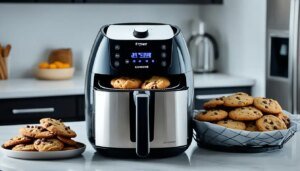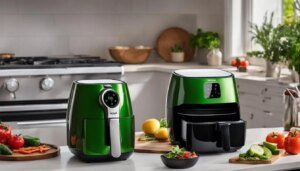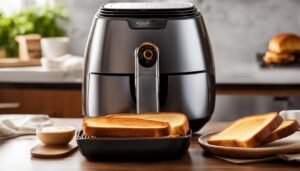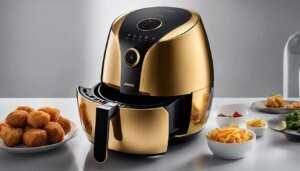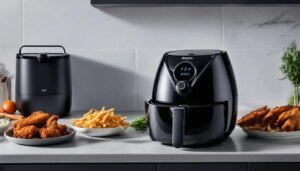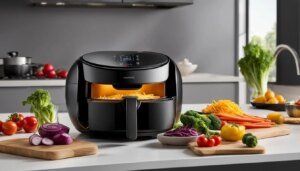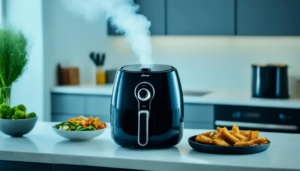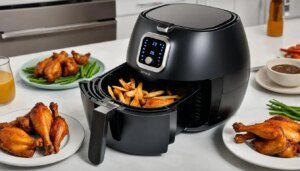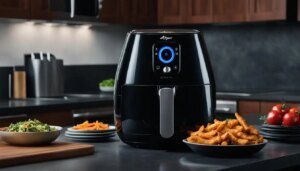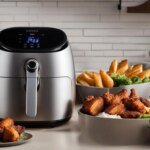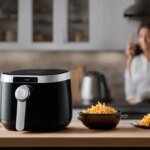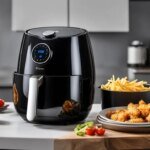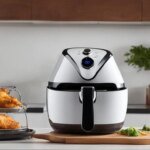Email: connect@airfryeraid.com
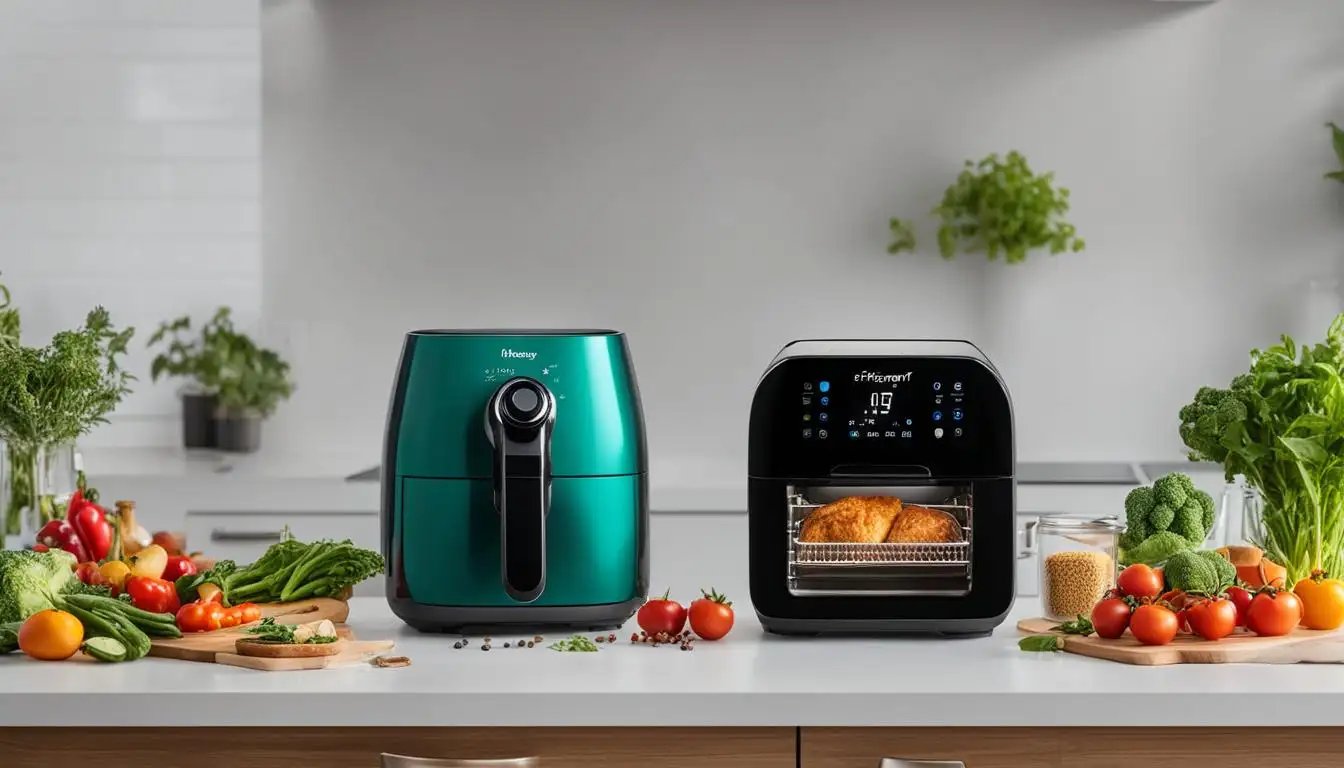

When considering energy consumption in the kitchen, finding appliances that strike a balance between efficiency and performance is essential. Air fryer ovens have gained popularity in recent years due to their ability to produce delicious, crispy food with significantly less oil.
But do these appliances guzzle electricity? Let’s take a closer look.
Key Takeaways:
- Air fryer ovens are known for their energy-saving benefits compared to traditional ovens.
- Factors such as upfront purchase costs, food quantity, and efficiency affect the cost-effectiveness of air fryer ovens.
- The wattage of an air fryer determines its energy consumption, with higher wattage models using more electricity.
- Air fryers are generally more cost-effective for smaller households and have quick cooking times.
- Larger households or meals requiring multiple rounds of cooking may find traditional ovens to be a more economical choice.
Do Air Fryer Ovens Use A Lot Of Electricity?
Air fryers are more energy-efficient than traditional ovens, consuming approximately 1,400 watts of power. Most air fryers have a power rating between 800 and 1800 watts, with 1400 watts being the average.
- This power rating indicates the amount of energy the appliance requires to operate effectively.
- The wattage of an air fryer depends on its size, with smaller models ranging from 800-1,000 watts, medium-sized models ranging from 1,200-1,400 watts, and larger models ranging from 1,600-1,800 watts.
- The amperage draw of air fryers can range from 6.67 amps to 15 amps, depending on the voltage and wattage. Factors such as the size of the air fryer, voltage, usage time, and frequency of use can affect the overall electricity consumption.
- In comparison to ovens, air fryers are considered to be a more energy-efficient option for cooking, especially for smaller households and quicker cooking times.
Air Fryer Power Consumption
Let’s take a look at the power consumption of different air fryer sizes:
| Air Fryer Size | Wattage | Amperage |
|---|---|---|
| Small (800-1,000 watts) | 800-1,000 W | 6.67-8.33 A |
| Medium (1,200-1,400 watts) | 1,200-1,400 W | 10-11.67 A |
| Large (1,600-1,800 watts) | 1,600-1,800 W | 13.33-15 A |
The wattage and amperage of an air fryer vary based on its size. Smaller air fryers consume less electricity, while larger models have higher power requirements. If you’re concerned about air fryer electricity usage, opting for a smaller size can help reduce energy consumption.
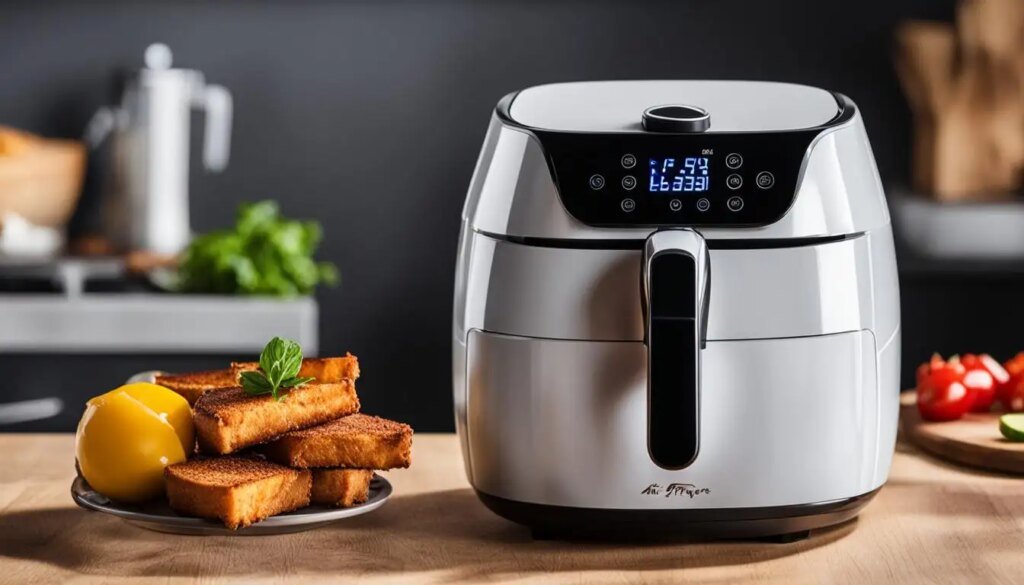

How Much Does It Cost To Run An Oven?
Conventional ovens typically consume between 2,000 to 5,000 watts of energy, with the exact usage depending on the temperature set. But what does that mean in terms of your electricity bill?
Running a 0.63 kWh oven at 400 degrees F costs around 21c per hour. To calculate the cost of running your oven, you can use the following formula:
Cost = (Power per cycle in kWh) x (Number of hours used) x (Cost of electricity per unit)
- The specific cost will vary depending on your electricity rate, which you can find on your utility bill.
- Shorter cooking times will naturally cost less than longer ones.
- Consistently opening the oven door can cause heat loss, resulting in the oven consuming more energy to maintain the desired temperature.
- Preheating the oven adds to the overall energy consumption.
- Ovens do have an advantage when it comes to cooking larger quantities of food in one go, making them a suitable choice for larger households or meals with bigger portion sizes.
However, it’s important to be mindful of your cooking habits and aim for efficiency to reduce unnecessary energy usage.
Comparing To Traditional Cooking Methods
When comparing the electricity usage of air fryer ovens to traditional cooking methods, such as conventional ovens or deep fryers, air fryers generally consume less energy.
- Traditional ovens often require a longer preheating time and a larger amount of energy to maintain a consistent temperature throughout the cooking process.
- Deep fryers, on the other hand, require a significant amount of oil to submerge the food, leading to higher energy consumption. Deep frying can result in longer cooking times due to the need for oil to reach the desired temperature.
Factors Affecting Energy Consumption
While air fryer ovens are generally more energy-efficient than traditional cooking methods, some factors can affect their electricity usage:
- Cooking Time: The duration for which the air fryer oven is in use will impact its energy consumption. Longer cooking times will result in more electricity usage.
- Food Quantity: The amount of food being cooked plays a role in energy consumption. Cooking larger quantities of food may require more energy to ensure even cooking throughout.
- Power Settings: Some air fryer ovens offer different power settings or cooking modes that can affect energy usage. Lower power settings may consume less electricity but may also result in longer cooking times.
- Insulation and Efficiency: The insulation and overall efficiency of the air fryer oven can impact its energy consumption. Well-insulated models will retain heat better, requiring less energy to maintain the desired cooking temperature.
FAQs
What is the Energy Consumption of Air Fryer Ovens and How Does It Compare to Other Cooking Methods?
Understanding how much power an air fryer uses helps gauge its efficiency. Typically, air fryer ovens consume less energy than conventional ovens, using about 1,500 watts on average. Compared to deep frying or baking, air fryers can cook food using less electricity, reflecting in lower energy bills and a smaller carbon footprint.
How Does the Energy Consumption of Air Fryer Ovens Compare to Electric Ovens?
When comparing air fryer vs electric oven cost, it’s important to consider energy consumption. Air fryer ovens use less energy than electric ovens due to their smaller size and quicker cooking times. This means lower utility bills and reduced environmental impact, making air fryer ovens a more cost-effective option in the long run.
Tips For Energy Efficiency
To minimize electricity usage while using an air fryer oven, consider the following tips:
- Preheating: Avoid preheating the oven for longer than necessary. Most air fryers do not require preheating or need only a short preheating time.
- Batch Cooking: If cooking multiple batches of food, try to cook them all at once instead of reheating the oven multiple times.
- Proper Sizing: Choose an air fryer oven that suits your cooking needs without being excessively large. A smaller model will consume less energy.
- Regular Maintenance: Keep the air fryer oven clean and well-maintained to ensure optimal performance and energy efficiency.
Bottom Line
Overall, air fryers offer a more cost-effective and energy-efficient way of cooking compared to traditional cooking methods. Their power consumption is typically lower than that of conventional ovens and deep fryers.
However, factors such as cooking time, food quantity, power settings, and overall efficiency can influence the electricity usage of an air fryer oven.
Air fryers reduce electricity costs and adopting a more sustainable lifestyle, particularly for smaller households and meals that require shorter cooking times.
The cost to run an air fryer for 15 minutes is generally lower than that of running an oven for the same duration, making air fryers a more economical choice.
Consider various factors before deciding between an air fryer and an oven. The wattage and size of the air fryer, as well as your usage patterns, can impact its cost-effectiveness. Larger air fryers with higher wattages may consume more electricity, reducing their overall cost efficiency compared to smaller models.
Ultimately, whether you opt for an air fryer or an oven, selecting cost-effective kitchen appliances will not only save you money in the long run but also contribute to a greener and more energy-conscious kitchen.
Happy cooking!
AirfyerAid
